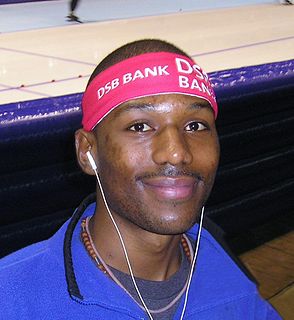A Quote by RuPaul
There's really no way to fast-track someone because the rate that their brain is able to interpret the information they're getting is on pace with life.
Related Quotes
When confronted with information streaming from the eyes, the brain will interpret this information in the quickest and most efficient way possible. Time is energy. The longer the brain spends performing some calculation, the more energy it consumes. Considering the brain runs on about 40 watts of power (a lightbulb!), it doesn't have a lot of energy to spare.
You can't really explain competing in Olympic event to someone. You can say, "Oh, that was really tough." And that literally means nothing to someone. If you can give some sort of comparison, because that's really all track and field is about any way....Usain Bolt runs a time and you get to see what everybody else's time is. It would just be interesting to compare Olympians to somebody who doesn't train their whole life.
I love dipping into worlds at a fast and furious pace. A little glimpse allows the audience to put together the rest of that world in their brain. I love sketches that require the audience to piece together the comedic engine themselves. Give them all the information but not tell them what the scene is about so they can have that eureka moment of, "Oh my God, he's only used to the way urban students pronounce their names. That's what's going on here.".
I try to see what the dream might be referring to - because the information in the world is being interpreted by my brain which only has the concepts derived from our five senses. So I think of the sequences in my dream as my brain doing its very best to process information in a way it knows I can deal with.
Normally if you add information to information, you have more information. In case of my art, I destroy information, I would say, because the image is disturbed by the writings. In a way, they become pure imagery. For me it's really fun because it's an idealistic approach to images, to just play around with information and see what's happening.
The pace at which science has progressed has been too fast for human behaviour to adapt to it. As I said we are still apes. A part of our brain is still a paleo-brain and many of the reactions come from our fight or flight instinct. As long as this part of the brain can take over control the rational part of the brain (we will face these problems).
On the one hand information wants to be expensive, because it's so valuable. The right information in the right place just changes your life. On the other hand, information wants to be free, because the cost of getting it out is getting lower and lower all the time. So you have these two fighting against each other.
My mind goes really quickly and I tend to talk really fast, as you've probably heard, I sometimes lose track of my syntax, as I'm talking that fast. The only thing I try to do, well, it's slow down, but also I do something when I'm reading that's similar to when I'm writing a section, which is to really try to imagine you on the other side, in a certain way, as an intelligent, sympathetic presence who's rooting for me to tell you a good story.
The information. Every bit that of information that was ever in your brain. But the information is not the mind Jenna. That we've never accomplished before. What we've done with you is groundbreaking. We cracked the code. The mind is an energy that the brain produces. Think of a glass ball twirling on your fingertip. If it falls, it shatters into a million pieces. All the parts of a ball are still there, but it will never twirl with that force on your fingertip again. The brain is the same way.
So it's like your brain has a large filing cabinet and it's opening up each drawer and it's taking in various images and memories from the day, consolidating what it needs to and puts in whatever file. And then if there's something that doesn't fit in any of the files and doesn't really belong, you'll forget about it. So it's a way of really getting a succinct way of storing things in your brain.



































